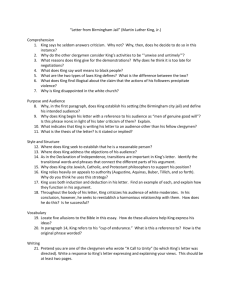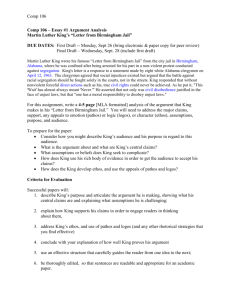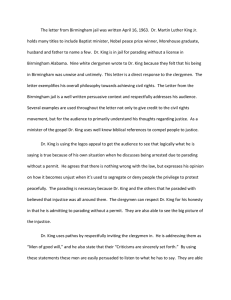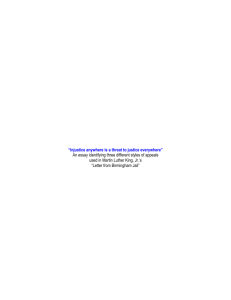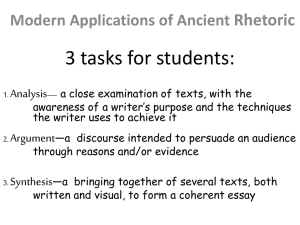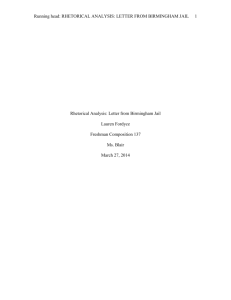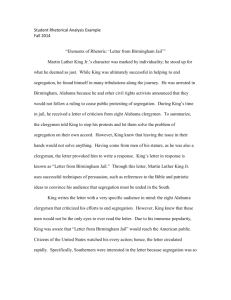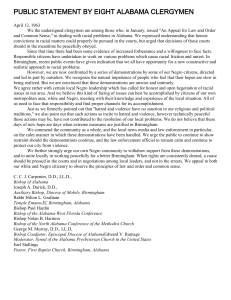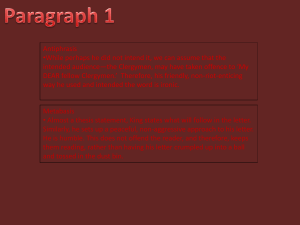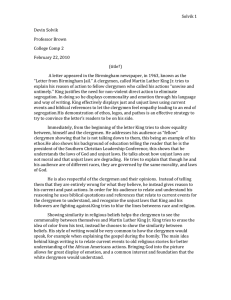The Media - Lindsay's ePortfolio
advertisement
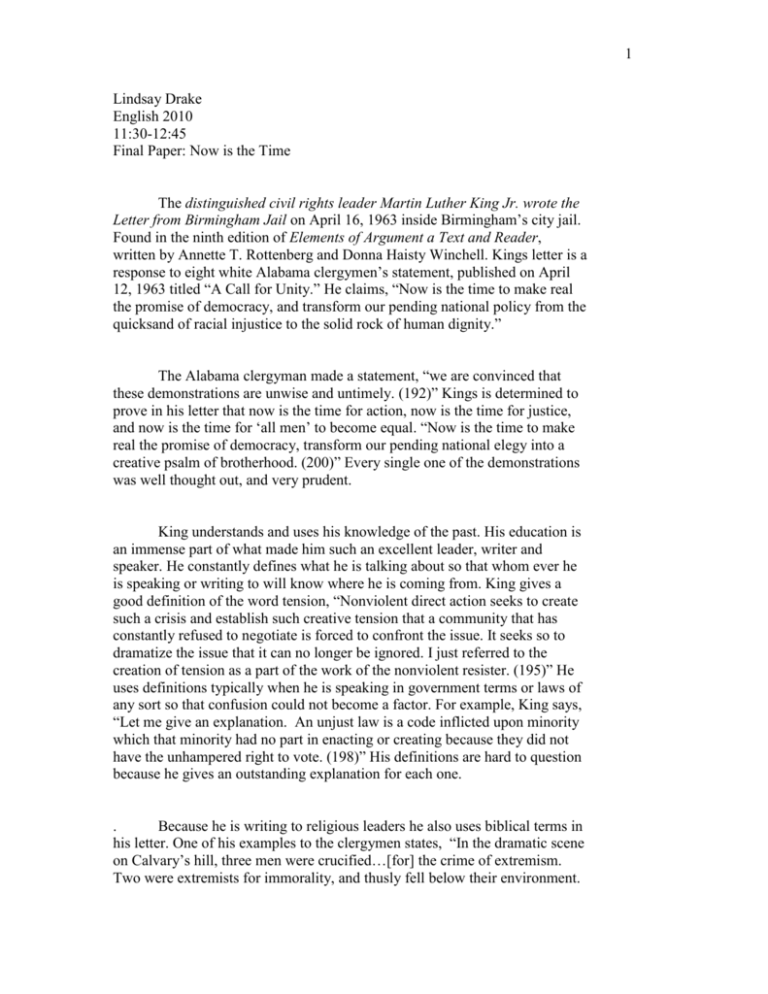
1 Lindsay Drake English 2010 11:30-12:45 Final Paper: Now is the Time The distinguished civil rights leader Martin Luther King Jr. wrote the Letter from Birmingham Jail on April 16, 1963 inside Birmingham’s city jail. Found in the ninth edition of Elements of Argument a Text and Reader, written by Annette T. Rottenberg and Donna Haisty Winchell. Kings letter is a response to eight white Alabama clergymen’s statement, published on April 12, 1963 titled “A Call for Unity.” He claims, “Now is the time to make real the promise of democracy, and transform our pending national policy from the quicksand of racial injustice to the solid rock of human dignity.” The Alabama clergyman made a statement, “we are convinced that these demonstrations are unwise and untimely. (192)” Kings is determined to prove in his letter that now is the time for action, now is the time for justice, and now is the time for ‘all men’ to become equal. “Now is the time to make real the promise of democracy, transform our pending national elegy into a creative psalm of brotherhood. (200)” Every single one of the demonstrations was well thought out, and very prudent. King understands and uses his knowledge of the past. His education is an immense part of what made him such an excellent leader, writer and speaker. He constantly defines what he is talking about so that whom ever he is speaking or writing to will know where he is coming from. King gives a good definition of the word tension, “Nonviolent direct action seeks to create such a crisis and establish such creative tension that a community that has constantly refused to negotiate is forced to confront the issue. It seeks so to dramatize the issue that it can no longer be ignored. I just referred to the creation of tension as a part of the work of the nonviolent resister. (195)” He uses definitions typically when he is speaking in government terms or laws of any sort so that confusion could not become a factor. For example, King says, “Let me give an explanation. An unjust law is a code inflicted upon minority which that minority had no part in enacting or creating because they did not have the unhampered right to vote. (198)” His definitions are hard to question because he gives an outstanding explanation for each one. . Because he is writing to religious leaders he also uses biblical terms in his letter. One of his examples to the clergymen states, “In the dramatic scene on Calvary’s hill, three men were crucified…[for] the crime of extremism. Two were extremists for immorality, and thusly fell below their environment. 2 The other, Jesus Christ, was an extremist for love, truth, and goodness, and thereby rose above his environment. (201-2)” In King’s letter to the clergymen, he uses more Christian terms because they were his intended audience. Little did King know that New York Post Sunday Magazine would publish extensive excerpts from his letter on May 19, 1963 without his consent. The point of King’s letter was to rebuttal the claims made by the clergymen in their statement, “A Call for Unity”. Some of their claims being ‘unwise and untimely’, ‘directed and led in part by outsiders,’ ‘such actions incite to hatred and violence,’ and even praising their law enforcement ‘on the calm matter in which these demonstrations have been handled.’(192-3) King’s intentions are to prove to his opponents that he has sufficient authority, has the right to be there and can push for the cause of justice for all. His entire letter took the claims of the clergymen and nipped them in the rear end. King shares this with the clergymen, “I don’t believe you would so quickly commend the policemen if you would observe their ugly and inhuman treatment of Negroes here in the city jail; if you would watch them push and curse old Negro women and young girls; if you would see them slap and kick old Negro men and young boys; if you will observe them, as they did not on two occasions, refuse to give us food because we wanted to sing our grace together. (205)” He gives the facts, he does not beat around the bush. He is a church leader; he was able to share morals and beliefs against his opponents because of his knowledge of the bible. He used policy and value claims through religious context. King says, “The judgment of god is upon the church as never before. If the church of today does not recapture the sacrificial spirit of the early church, it will lose it’s authentic ring, forfeit the loyalty of millions, and be dismissed as an irrelevant social club with no meaning for the twentieth century. (204)” They helped him to prove his point and to rebut the claims of the religious leaders. Imagery, similes, historical illusions are all part of what makes King such a convincing speaker and writer. He wears his heart on his sleeve, a good example of pathos. His use of descriptive words is powerful, “I am convinced that by now many streets of the South would be flowing with floods of blood. (201)” He does not say anything that would be considered ‘fluff.’ Everything is written in such creative detail that it locks in his audience. He keeps in mind who his audience is, and will use stories and examples that can help him to prove his point. He was writing to clergymen in this letter, “there is nothing new about this kind of disobedience. It was seen sublimely in the refusal of Shadrach, Meshach, and Abednego to obey the laws of Nebuchadnezzar because a higher moral law was involved. (198)” He also used his skill in 3 imagery against the clergymen’s letter. “You warmly commended the Birmingham police force for keeping “order” and “preventing violence.” I don’t believe you would have so warmly commended the police force if you had seen its angry violent dogs literally biting six unarmed, nonviolent Negroes. (205)” He shares that he is a great grandson of a preacher, so he is a fourth generation preacher. That is ethos; he proves his credibility with his ‘as-amatter-of-fact’ statements. “I am in the rather unique position of being the son, the grandson, and the great-grandson of preachers. (203)” Even in the beginning of his letter, he proved why he had the right to be in Birmingham, Alabama. He was not the ‘outsider’ that the clergymen pinpointed him to be. “I have the honor of serving as president of the Southern Christian Leadership Conference, and organization operating in every southern state, with headquarters in Atlanta, Georgia. We have some eighty-five affiliate organizations all across the South—one being the Alabama Christian Movement for Human Rights. (193)” One of Kings special abilities as a writer is to use other sources of information in his work. “To put it in the terms of Saint Thomas Aquinas, and unjust law is a human law that is not rooted in eternal or natural law. Any law that uplifts human personality is just. Any law that degrades human personality is unjust.” Kings logic/logos was to use both government terms and religious terms together in the same definition. He uses several well know people in his letter; Jesus Christ, Amos, Paul, Martin Luther, John Bunyan, Abraham Lincoln, Elijah Muhammad, Shadrach, Meshach, and Abednego. He wrote this letter in a jail cell; he had no books or other physical sources to use while he wrote this letter. It all came from his memory and he used it to his advantage. King’s letter as a whole flowed incredibly smoothly, considering the fact that he was writing in a jail cell. He was able to share how he felt about “A Call for Unity” directly and indirectly using other resources that were not his own. You can feel how tired his is of the church telling them to ‘wait.’ “ “‘Wait!’ It rings in the ear of every Negro with a piercing familiarity. This ‘Wait’ has almost always meant ‘Never.’ (196)” You can hear the frustration in his tone and feel it when he share experiences that the Negroes went through. It was not a light subject, which meant his response letter would not be light either. It was filled with burdens and heartache that was written for the clergymen to feel, and hopefully feel inclined to help change. This letter made an impact on not only the audience of the time, but also for the years that came after it. It can change lives today; they just have to read it.
